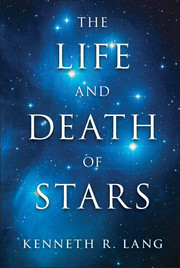Book contents
- Frontmatter
- Contents
- List of Focus Elements
- List of Tables
- Preface
- 1 Light of the Sun
- 2 Gravity and Motion
- 3 Atomic and Subatomic Particles
- 4 Transmutation of the Elements
- 5 What Makes the Sun Shine?
- 6 The Extended Solar Atmosphere
- 7 Comparisons of the Sun with Other Stars
- 8 The Lives of Stars
- 9 The Material Between the Stars
- 10 New Stars Arise from the Darkness
- 11 Stellar End States
- 12 A Larger, Expanding Universe
- 13 Birth, Life, and Death of the Universe
- Quotation References
- Author Index
- Subject Index
- Plate section
3 - Atomic and Subatomic Particles
Published online by Cambridge University Press: 05 February 2013
- Frontmatter
- Contents
- List of Focus Elements
- List of Tables
- Preface
- 1 Light of the Sun
- 2 Gravity and Motion
- 3 Atomic and Subatomic Particles
- 4 Transmutation of the Elements
- 5 What Makes the Sun Shine?
- 6 The Extended Solar Atmosphere
- 7 Comparisons of the Sun with Other Stars
- 8 The Lives of Stars
- 9 The Material Between the Stars
- 10 New Stars Arise from the Darkness
- 11 Stellar End States
- 12 A Larger, Expanding Universe
- 13 Birth, Life, and Death of the Universe
- Quotation References
- Author Index
- Subject Index
- Plate section
Summary
Inside the Atom
What is matter made of? To find out, we might try breaking any material object into increasingly smaller pieces until we reach a stage when the smallest piece cannot be broken apart. The last step in this imaginary, successive division of matter suggests the existence of unseen atoms, a Greek word meaning “indivisible,” or something that cannot be divided further.
In the fifth century BC, for example, the ancient Greek philosopher Democritus and his mentor Leucippus proposed that all matter is composed of combinations of a small number of separate atoms coming together in different ways. They supposed that all substances are composed of four types of elemental atoms: air, earth, fire, and water. Mud, for example, could be made from earth and water, and fire could turn water into vapor, or air.
Then, about two millennia ago, the Roman poet Titus Lucretius Carus (Lucretius) wrote a wonderful epic poem, in Latin De Rerum Natura (On the Nature of the Universe), which described these indestructible atoms that are so exceedingly small that they are invisible and infinitely vast in number. To Lucretius, these atoms were the building blocks of all that exists; the fundamental idea persists to this day. Everything that we see, from a friend to a tree, to the Sun and the stars, consists of innumerable atoms, all moving randomly about, colliding, gathering together, and breaking apart again. The atoms are immortal, the former ingredients of all that existed in the past and the seeds of everything that will exist in the future.
All ordinary matter indeed is composed of elemental atoms, and there is a limited number – ninety-four naturally occurring atoms – detected directly on the Earth or in astronomical spectra. These atoms are known also as chemical elements because they cannot be decomposed by chemical means. They are very small and exceedingly numerous. A simple drop of water contains about 100,000 billion billion, or 1023 atoms – close to the number of stars in the universe.
- Type
- Chapter
- Information
- The Life and Death of Stars , pp. 31 - 57Publisher: Cambridge University PressPrint publication year: 2013



